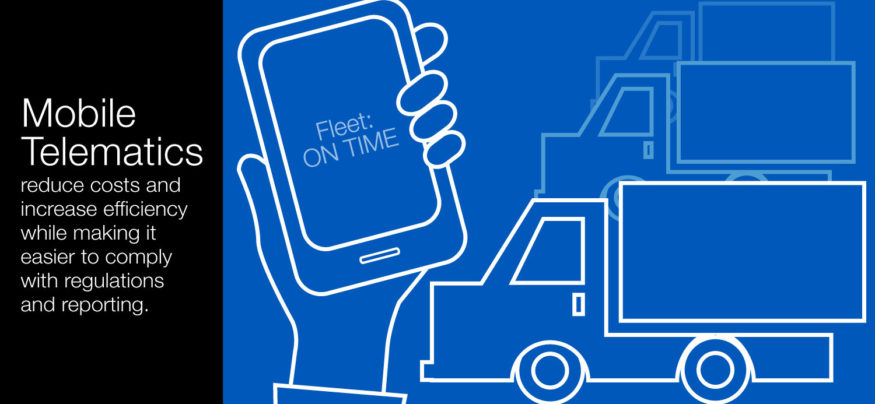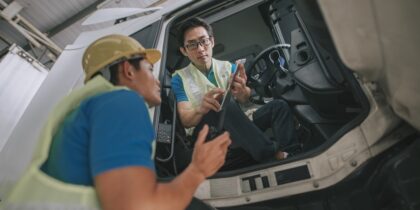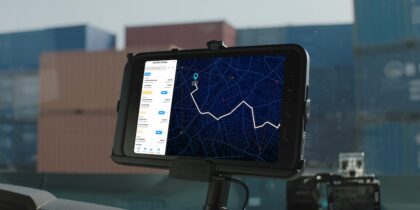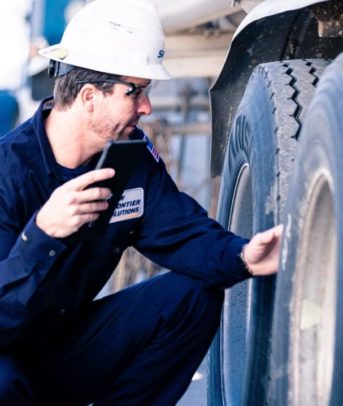Spurred by regulatory changes and the relentless pursuit of efficiency, transportation fleets are moving from proprietary, in-cab devices to Android-powered fleet telematics solutions.
Trucking fleets face a number of logistical and regulatory challenges, in addition to poor driver-retention rates and inefficiencies with communication and navigation. One of the largest areas for improvement relates to the logbooks that truckers must maintain. America’s 4.2 million truck drivers spend an average of 110 hours per year completing paper logbooks. Then, according to PeopleNet research, management spends 51 million hours reviewing and storing hard copy log records, and the fleet’s back office spends an average of three minutes per logbook, per day reviewing for accuracy and completeness. The total annual cost of paperwork compliance is more than $63.3 million per year.
To address these common issues, PeopleNet, a leading provider of fleet telematics technology, partnered with Samsung to offer PeopleNet telematics on Android-powered smartphones and tablets. These electronic logging devices allow trucking organizations to move these paper-based processes into electronic formats, saving everyone, from the driver to workers in the back office, a lot of time.
Internet of Things Powers Fleet Management Efficiency
The PeopleNet devices allow trucking fleets to do more than simply maintain electronic logbooks. They collect data from a variety of inputs, such as GPS trackers and maintenance sensors, and integrate them with the enterprise’s real-time, predictive analytics. This helps carriers make more effective decisions about all aspects of their operations, from workers, to trucks, to routes and more. PeopleNet refers to their holistic approach to trucking technology as “Internet of Transportation Things (IoTT).”
According to Ellie Walradth, marketing communications director for PeopleNet, “The IoTT is an umbrella for all that PeopleNet is doing in the fleet management space, and Samsung devices are part of the ecosystem to help manage this data.” The new, off-the-shelf mobility solution allows fleets to deploy proprietary company apps, approved third-party programs and PeopleNet software on the same device. This holistic approach works, explains Walradth, as transportation fleets using the PeopleNet solution average 21 percent lower vehicle and operating costs.
Android Devices Deliver a Seamless User Experience
Through its partnership with Samsung, PeopleNet is achieving its goal to support corporate-owned, personally enabled (COPE) mobile devices. This will address the market need for multiplatform accessibility and enterprise mobility management, particularly among for-hire and private fleets of 25 trucks or more.
Smartphones and tablets help fleets retain drivers by giving them the tools they need, increasing driver satisfaction. According to Walradth, “This is one thing fleets can do to let drivers have some personal mobility with the device, and Samsung helps fleets give drivers some of that personal enablement.” The Android-based solution gives drivers the flexibility to use the device on their own time, running company-allowed personal applications with the confidence that company data and software won’t be affected.
Other benefits of the PeopleNet solution include easy management of both business and personal apps on the device, remote assistance for drivers during support cases and troubleshooting, enhanced user experience through customizable home screens, and the ability to quickly secure and remove mobile devices.
Wi-Fi-enabled devices can make use of the PeopleNet mobile gateway, which provides wireless hot spot capabilities in the cab. Drivers can connect their company-owned devices as well as personal devices to PeopleNet’s private cellular network. Walradth explains, “With the IoTT, the mobile gateway can connect wirelessly with essentially anything in or around the vehicle, whether the driver is wearing a personal fitness device or watching a movie on their tablet. It’s an unlimited opportunity to connect with these devices.”
For PeopleNet, the next wave of development will support fleet management applications that make sense of all the data flowing in from the vehicles. Walradth adds, “We’ll be able to help fleets make decisions about how much trucks cost to operate and which trucks they should trade in. The sky is the limit on what we can do from an analytics standpoint.”
Telematics capabilities are evolving fast. What do you see in the future of the IoTT? Leave a comment below.








